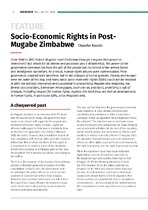Socio-economic rights in post-Mugabe Zimbabwe
Abstract
From 1980 to 2017, Robert Mugabe ruled Zimbabwe through a regime that posed as
‘democratic’ but which for all intents and purposes was a dictatorship. The power of the
government stemmed not from the will of the people but its control of the armed forces
and intelligence operatives. As a result, human rights abuses were commonplace. Poor
governance, coupled with sanctions, led to the collapse of social systems. Poverty and hunger
were the order of the day, and many basic socio-economic rights (SERs) could not be realised.
In 2017, the military intervened and succeeded in pressurising Mugabe into resigning. His
former vice president, Emmerson Mnangagwa, took over as president, promising a raft of
changes, including respect for human rights. Against this backdrop, we look at developments
in human rights, in particular SERs, since Mugabe’s exit.

